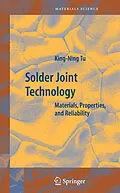The European Union's directive banning the use of lead-based (Pb) solders in electronic consumer products has created an urgent need for research on solder joint behavior under various driving forces in electronic manufacturing, and for development of lead-free solders. This book provides a comprehensive examination of advanced materials reliability issues related to copper-tin reaction and electromigration in solder joints, and presents methods for preventing common reliablity problems.
Zusammenfassung
Solder joints are ubiquitous in electronic consumer products. The European Union has a directive to ban the use of Pb-based solders in these products on July 1st, 2006. There is an urgent need for an increase in the research and development of Pb-free solders in electronic manufacturing. For example, spontaneous Sn whisker growth and electromigration induced failure in solder joints are serious issues. These reliability issues are quite complicated due to the combined effect of electrical, mechanical, chemical, and thermal forces on solder joints. To improve solder joint reliability, the science of solder joint behavior under various driving forces must be understood. In this book, the advanced materials reliability issues related to copper-tin reaction and electromigration in solder joints are emphasized and methods to prevent these reliability problems are discussed.
Inhalt
CopperTin Reactions.- CopperTin Reactions in Bulk Samples.- CopperTin Reactions in Thin-Film Samples.- CopperTin Reactions in Flip Chip Solder Joints.- Kinetic Analysis of Flux-Driven Ripening of CopperTin Scallops.- Spontaneous Tin Whisker Growth: Mechanism and Prevention.- Solder Reactions on Nickel, Palladium, and Gold.- Electromigration and Thermomigration.- Fundamentals of Electromigration.- Electromigration in Flip Chip Solder Joints.- Polarity Effect of Electromigration on Solder Reactions.- Ductileto-Brittle Transition of Solder Joints Affected by CopperTin Reaction and Electromigration.- Thermomigration.
